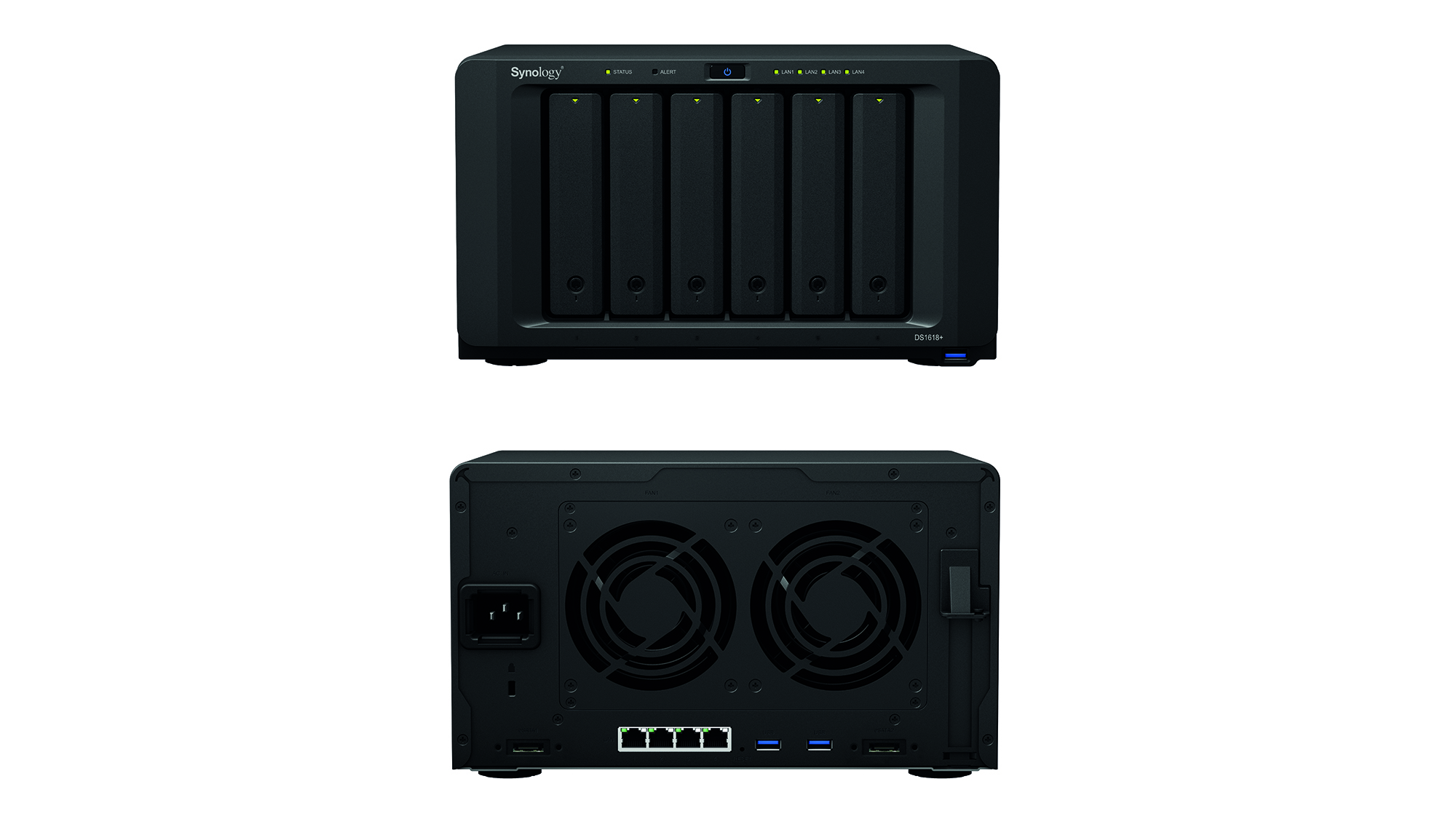Synology DiskStation DS1618+ review
A well-priced and powerful desktop NAS with a ton of business features and support for 10-Gigabit upgrades


Its new Atom CPU and big DDR4 memory capacity makes the Synology RackStation DS1618+ a great choice for handling a wide range of network storage duties with room on top for plenty of apps. 10GbE performance is a little uneven but is good enough for the target market of small businesses and at £634 for a diskless unit, it’s great value as well.
-
+
Great upgrade potential; Affordable; Powerful hardware
-
-
10GbE performance is a little wobbly

Synology launched its first 6-bay NAS appliance, the DS3018xs, last year, joining its 5-bay and 7-bay units. But this year sees the introduction of the more powerful DS1618+, which has been specifically designed for small businesses that need lots of storage at a lower cost.
Some of the Synology DiskStation DS1618+'s headline upgrades include its revamped Atom C3538 CPU and capacious 32GB DDR4 memory capacity that transform it into a worthy upgrade for businesses looking to migrate perhaps from an older NAS. It also presents as a viable alternative to Synology's 5-bay DS1517+ and 8-bay DS1817+ which are both pretty outdated now, running on the more sluggish Atom C2538 chips.
From a design point of view though, nothing has changed much. The chassis is still robust and sturdy, offering the impression that this desktop NAS won't buckle under pressure. There's quad Gigabit, triple USB 3 and dual eSATA ports if connectivity is important to you, with a PCI-Express slot for use with 10GbE adapters or Synology's proprietary M2D18 dual M.2 NVMe/SSD high-speed cache card.
There are various configuration options available. For example, memory starts at 4GB, but if you want to boost that, it's a pretty simple process - just top up the memory by upgrading SO-DIMM memory in the two slots behind a removable hatch under the cover. If you want to add more racks to the NAS, you can extend via two eSATA ports that allow you to add-on more of Synology's 5-bay DX517 expansion units.
The appliance uses tool-free drive carriers and for testing, we slipped in a quartet of 10TB Seagate IronWolf hard disks. We availed ourselves of Synology's browser discovery service and allowed it to create a big 27.3TB SHR-1 (Synology Hybrid RAID) array.
Traditionalists can skip this and choose standard RAID5 or 6 arrays but SHR is designed to simplify array expansion just by adding more disks. Even better, you can change an SHR-1 array on the fly to an SHR-2 dual-drive redundant array.
It's been six months in the making but Synology's DSM 6.2 is out of beta testing and ready for some live action. Look no further if data protection is on your mind, as it's brimming with backup features.
For starters, BTRFS volumes support on-demand and scheduled snapshots which can be replicated to remote Synology appliances. Next up is the Hyper Backup app which manages all your local, remote, Rysnc and cloud backups and has wizards for 19 task types.
The Cloud Sync app supports 22 public providers and we used the Cloud Station Server app to create a private cloud for workstation and mobile backups. The Active Backup for Business app doesn't need a local agent as it can secure network shares on Windows and Linux systems.
With a maximum 32GB of memory, the DS1618+ can be a virtualisation host for any OS of your choice. We used the Virtual Machine Manager (VMM) app to load up a Windows Server 2016 VM in 20 minutes, employed protection plans to regularly snapshot the VM and created copies using the clone option.
Synology's Surveillance Station app offers a wealth of IP camera monitoring and video recording services. You get two camera licenses included in the price and we linked it up with our Axis M3015-LVE and Samsung Wisenet PNF-9010R cameras, created recording schedules, enabled motion detection and used the e-Map facility to pinpoint their location.
For 10GbE speed testing, we installed an Emulex 10GBase-T adapter which the DS1618+ accepted without any issues. With a share mapped to an E5-2600 v4 Xeon Windows server, we recorded fast Iometer sequential read speeds of 9.2Gbits/sec but much lower 4.3Gbits/sec write rates. Adding a second server with a dedicated mapped share and 10GbE connection saw cumulative read and write rates of 11.9Gbits/sec and 5.1Gbits/sec.
Although less significant, we saw similar discrepancies in our real-world tests as our 25GB test file was read from the appliance at 4.8Gbits/sec, but written to it at 3.4Gbits/sec. General backup performance was better though, with a 22.4GB folder containing 10,500 small files secured to a share at a respectable 2.3Gbits/sec.
Its new Atom CPU and big DDR4 memory capacity makes the DS1618+ a great choice for handling a wide range of network storage duties with room on top for plenty of apps. 10GbE performance is a little uneven but is good enough for the target market of small businesses and at 634 for a diskless unit, it's great value as well.
Verdict
Its new Atom CPU and big DDR4 memory capacity makes the Synology RackStation DS1618+ a great choice for handling a wide range of network storage duties with room on top for plenty of apps. 10GbE performance is a little uneven but is good enough for the target market of small businesses and at £634 for a diskless unit, it’s great value as well.
Desktop chassis
2.1GHz Intel Atom C3538 CPU
4GB DDR4 (max 32GB)
6 x LFF/SFF hot-swap SATA drive bays
supports RAID0, 1, 10, 5, 6, SHR-1/2, hot-spare, JBOD
4 x Gigabit, 3 x USB 3
2 x eSATA
PCI-Express slot
3 year hardware warranty
Get the ITPro daily newsletter
Sign up today and you will receive a free copy of our Future Focus 2025 report - the leading guidance on AI, cybersecurity and other IT challenges as per 700+ senior executives
Dave is an IT consultant and freelance journalist specialising in hands-on reviews of computer networking products covering all market sectors from small businesses to enterprises. Founder of Binary Testing Ltd – the UK’s premier independent network testing laboratory - Dave has over 45 years of experience in the IT industry.
Dave has produced many thousands of in-depth business networking product reviews from his lab which have been reproduced globally. Writing for ITPro and its sister title, PC Pro, he covers all areas of business IT infrastructure, including servers, storage, network security, data protection, cloud, infrastructure and services.
-
 ‘Phishing kits are a force multiplier': Cheap cyber crime kits can be bought on the dark web for less than $25 – and experts warn it’s lowering the barrier of entry for amateur hackers
‘Phishing kits are a force multiplier': Cheap cyber crime kits can be bought on the dark web for less than $25 – and experts warn it’s lowering the barrier of entry for amateur hackersNews Research from NordVPN shows phishing kits are now widely available on the dark web and via messaging apps like Telegram, and are often selling for less than $25.
By Emma Woollacott Published
-
 Redis unveils new tools for developers working on AI applications
Redis unveils new tools for developers working on AI applicationsNews Redis has announced new tools aimed at making it easier for AI developers to build applications and optimize large language model (LLM) outputs.
By Ross Kelly Published
-
 Google layoffs continue with "hundreds" cut from Chrome, Android, and Pixel teams
Google layoffs continue with "hundreds" cut from Chrome, Android, and Pixel teamsNews The tech giant's efficiency drive enters a third year with devices teams the latest target
By Bobby Hellard Published